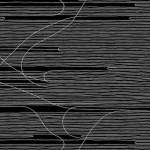
Oneida Absolute II
(Jagjaguwar)
Not many bands are afforded the luxury of a “triptych” of albums, especially one as indulgent as Oneida’s “Thank Your Parents” (of which Absolute II is part three). It’s unclear what the premise of the project has been, but it showcases Oneida spinning epic psychedelic drone records, sounding raw and uninhibited, experimenting wildly with styles. It began with 2008’s unified 40-minute composition Preteen Weaponry – a sprawling work that somehow morphs around various moods while never losing its vitality. Rated O (2009) was a triple album that was disparate but frequently brilliant, if it was unclear why they needed three discs. Both records had a boundless energy and it certainly sounded like they were having fun, amidst all the drone.
So how to compliment these two strong records? Oneida made the surprising decision to create a drumless, minimal album that doesn’t really give the listener much to latch on to. In short, by eschewing beats, they’ve sacrificed one of their strongest musical qualities. Oneida sound like they’re struggling to compensate for this lack of energy, creating texture by haphazardly layering low-end FX pedal loops and spinning each of the four tracks out way too long.
The word “triptych” (rather than “trilogy”) implies that the three records are supposed to be viewed simultaneously, and I suppose Absolute II is the dark, atmospheric underbelly to this strange beast. Opener Pre-Human starts promisingly, quivering with tension, before veering into directionless ambient swirls. And Horizon, the strongest track, menaces with an intriguing chopped-up vocal sample, but it proves exhaustive, drowned in way too much phaser-effect hum. Gray Area is a set of rhythmless, dissonant guitar stabs over feedback loops like revving engines, before Absolute II, the weirdest track, closes the album with seemingly randomly-arranged pockets of background noise; it sounds almost accidental. It makes more sense conceptually: Oneida have ended “Thank Your Parents” with a thorough deconstruction of their musical elements, often slowing down guitar sounds to emphasise every microscopic detail, but it’s simply difficult to listen to.
The whole album is unproductively experimental, it’s lazy – it requires a lot of patience, which Oneida do not reward. Absolute II doesn’t reveal anything on repeated listens, in spite of the densely woven textures. While it’s another prime example of Oneida defying expectations and challenging themselves as artists, it’s perhaps a step too far. It’s a blip in an otherwise solid discography. Perhaps it is a necessary step back, an outlet for darker ideas, because the band just don’t sound like they’re enjoying themselves as much as they once did. I hope we can count on them bouncing back after this with something once again completely different.
